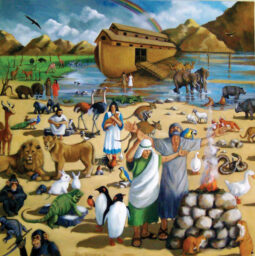Readings and a sermon by Serena Josolyne.
Readings
Sermon
Once again, the time has come for us to move forward on the special Lenten journey. Although the current circumstances have changed our schedules so much from those of any previous years, we can still adapt the path we take, to correspond with our own particular circumstances. The current pandemic has totally changed the role we normally take. In this country, as in most others in the world, the people have been robbed not only of their normal ways of life but of time. Time is the controlling aspect of our lives. We have a time for growing up and learning about the world we live in. We have a time in life when we find our own particular strengths and use them to the benefit of others (and ourselves). There are also those very important holiday times; when we can take a rest and prepare ourselves for the rest of the year. There are times of celebrations, some public, some personal, but times that we can share time with others. Despite the pandemic, these time periods still occur, but we are not able to use them in the same way. Some people are restricted from going to their normal place of work. Key workers put themselves at risk by travelling to work and helping others. Their extra work commitments can also deprive them of basic home-time with their families. Many other people, who can find ways of working from their homes, may well find that their working day has become much longer by having lost the benefit of normal teamwork with their colleagues. Everybody is suffering in some way and by losing important time from their lives, as well as many other basic needs.
If our lost time permits, let us start our journey by looking at today’s three chosen readings: they will help us to focus on the background of our faith and can encourage us to move forward each week, to look at the next set of chosen readings.
Today’s old testament reading may not appear to have much meaning to our modern lives, but it does hold a useful message. Noah had just successfully negotiated the great flood and found dry land at last. Once Noah and his family were safe on land, God instructed them on how they must live their future lives, following the flood that cleansed the world of evil. God’s instructions were intended not just for Noah’s family but for all future generations. Humans were to have the supremacy over all other living things, together with the promise that there would be no repeat of that drastic cleansing. In return for this promise, God laid down some basic rules that he expected all humans to follow, stressing in particular that humans were not to kill other humans. As we can remember, many generations later, these rules were to be revised and extended, by the ten commandments given to Moses on Mount Sinai.
In the New Testament reading, Peter reminds us that Jesus underwent his great suffering at that particular time for the benefit of all people. He had demonstrated that his spirit remained alive even though, in earthly terms, his body was dead. This passed on the message and the good news for everyone, that earthly death does not mean the end of spiritual life. Peter tells us that Christ owes his continuing spiritual life to his baptism by John, he compares it with the survival of Noah’s family following God’s cleansing of the world by the great flood of water. Peter makes it clear that the baptism by water is not a means of removing dirt but a true commitment to God, through the belief and acceptance of Christ’s resurrection.
Finally let us move to the Gospel reading from Mark. Unlike the Gospels of Matthew and Luke, Mark begins his gospel near the start of Christ’s ministry, when he is baptised by John, in the River Jordan (just before spending 40 days and nights in the wilderness). Mark describes the spectacular scene following the baptism of Jesus: And just as he was coming out of the water, he saw the heavens torn apart and the spirit descending like a dove on him. And a voice came from Heaven, ‘You are my Son the Beloved; with you I am well pleased.’ [Mark 1:10 &11].
Water has always been the most important commodity on earth, for humans and animals alike; in Noah’s time, by invoking the great flood, God had used water to cleanse the world. Therefore, it is not surprising that John had used water for all his baptisms including that of Jesus Christ. In the same way, we continue the tradition to this day with our baptisms of water.
Mark’s gospel makes only a brief mention of Jesus surviving 40 days and nights alone with wild animals in the wilderness and resisting the temptations of Satan. It then moves on quickly to the imprisonment of John and the start of Jesus’s ministry. As we look forward to the Easter of 2021, let us join Jesus in our own way, on his epic journey, a ministry of love.
